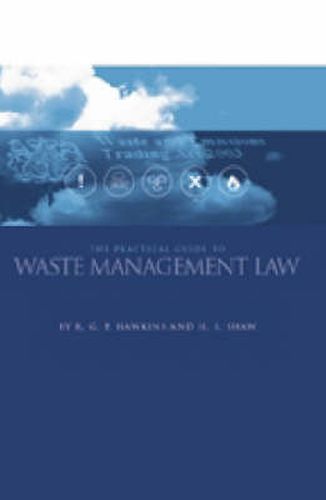Readings Newsletter
Become a Readings Member to make your shopping experience even easier.
Sign in or sign up for free!
You’re not far away from qualifying for FREE standard shipping within Australia
You’ve qualified for FREE standard shipping within Australia
The cart is loading…






This is the start of an enormous change in waste - both a challenge and an opportunity John Burns, Waste Implementation Programme Director, DEFRA In 2004 the Government is facing numerous challenges in the context of environmental management, and will be under pressure to perform for at least the next five years. Targets set in Brussels either by the European Commission or the European Parliament will not be met. Additionally, new environmental legislation continues to flow in from both Europe and Westminster. The new Planning and Compulsory Purchase Act 2004 with its implications for regional environmental decision-making, the new Permitting regime, the Waste Emissions Trading Act 2003, the implications of the Water Act 2003, the Household Recycling Act 2003, the introduction of controls for Agricultural Waste in 2004-5, and the ELV, the WEEE and the RoHS Regulations all have to be understood and new training undertaken. The changeover from the UK Carriage of Dangerous Goods regime to the EU ADR Regulations and the reclassification of Special into 91/689 Hazardous Waste will have technical, management and financial implications for industry, commerce and SMEs. The commercial and environmental effects of the new laws and practices are explained with reference to relevant websites to aid the reader to find further details and hopefully solutions to environmental difficulties which will be the responsibility of the Environment Agency, SEPA, Local Authorities, the Health and Safety Executive, the Vehicle Operator Services Agency, Customs and Excise and other named agencies. This book is intended primarily for engineers, surveyors, building contractors, accountants, geologists, environmental scientists, insurers and controllers of financial liability, transportation managers, local and central government regulators and enforcers - and of course, all who produce, manage, transport, reuse, reclaim and recycle waste.
$9.00 standard shipping within Australia
FREE standard shipping within Australia for orders over $100.00
Express & International shipping calculated at checkout
This is the start of an enormous change in waste - both a challenge and an opportunity John Burns, Waste Implementation Programme Director, DEFRA In 2004 the Government is facing numerous challenges in the context of environmental management, and will be under pressure to perform for at least the next five years. Targets set in Brussels either by the European Commission or the European Parliament will not be met. Additionally, new environmental legislation continues to flow in from both Europe and Westminster. The new Planning and Compulsory Purchase Act 2004 with its implications for regional environmental decision-making, the new Permitting regime, the Waste Emissions Trading Act 2003, the implications of the Water Act 2003, the Household Recycling Act 2003, the introduction of controls for Agricultural Waste in 2004-5, and the ELV, the WEEE and the RoHS Regulations all have to be understood and new training undertaken. The changeover from the UK Carriage of Dangerous Goods regime to the EU ADR Regulations and the reclassification of Special into 91/689 Hazardous Waste will have technical, management and financial implications for industry, commerce and SMEs. The commercial and environmental effects of the new laws and practices are explained with reference to relevant websites to aid the reader to find further details and hopefully solutions to environmental difficulties which will be the responsibility of the Environment Agency, SEPA, Local Authorities, the Health and Safety Executive, the Vehicle Operator Services Agency, Customs and Excise and other named agencies. This book is intended primarily for engineers, surveyors, building contractors, accountants, geologists, environmental scientists, insurers and controllers of financial liability, transportation managers, local and central government regulators and enforcers - and of course, all who produce, manage, transport, reuse, reclaim and recycle waste.